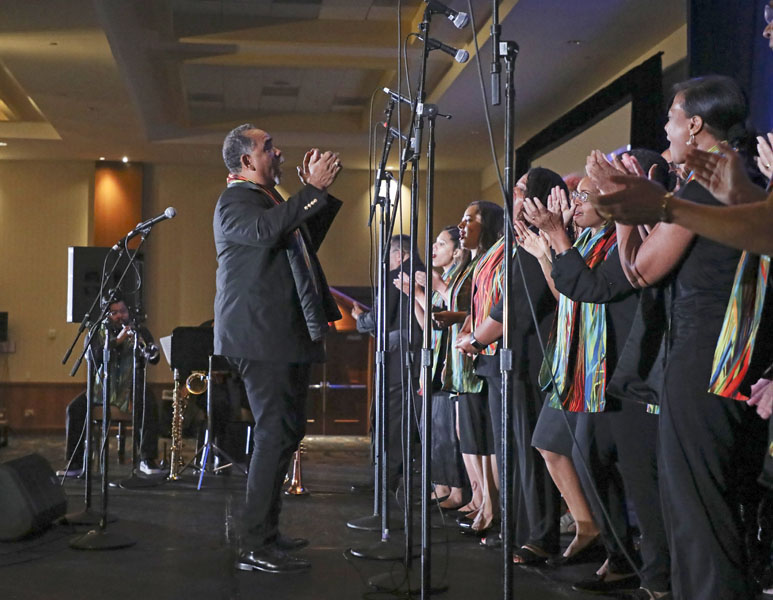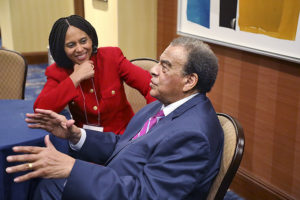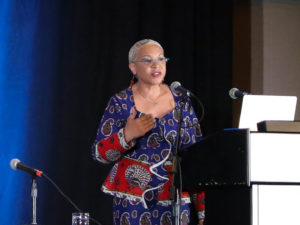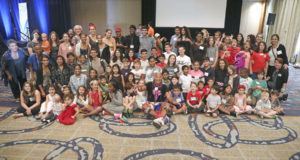



Attendees were moved on hearing the Rev. Andrew Young, civil rights icon and diplomat, address the 42nd annual conference of the Association for Baha’i Studies–North America.
It’s likely they weren’t totally surprised, though, given how far the association has come in helping Baha’is engage meaningfully in the issues of the day.
After all, “This is not just any academic conference,” the 1,400 people meeting Aug. 9–12 in Atlanta, Georgia, were told at the outset. It’s a message the association has been sending for years — that the conference is not just for academics.
Sure, the 42nd annual gathering had talks, breakout sessions and featured artistic presentations, same as other conferences.
But the focus, in more spaces than ever before, was on both the acquisition and application of knowledge by all. Participants were aided in attaining the skills and confidence to contribute Baha’i concepts of civilization building to the discourses of their professional and educational fields and of society as a whole.
Its location at the first hotel to be integrated in Atlanta, hub of the civil rights movement, made it altogether fitting to shine a bright light on bringing about nonviolent social change through constructive resilience in the face of oppression.
Fulfilling the vision of a “beloved community”


In welcoming the conference to her adopted hometown, Counselor Nwandi Lawson, an appointed adviser to Baha’i institutions in the Americas, noted that spaces were available for attendees of all ages to help move toward solving society’s ills, thanks to a first-ever youth conference and classes for children.
Additional opportunities for collaboration, she added, will come from ABS-initiated seminars throughout the year.
“We know with great confidence that the world we know today is not the world that will exist in the future,” said Lawson. “But it isn’t enough for us to sit back and watch as the process unfolds. … We have to figure out together what these principles look like in action.
“This is not just any academic conference.”
Kenneth E. Bowers, speaking on behalf of the National Spiritual Assembly of the Baha’is of the United States, echoed that sentiment.
Recalling the Rev. Martin Luther King Jr.’s vision of a “beloved community,” Bowers said the ultimate goal of living together harmoniously resonates with the teachings of Baha’u’llah, Prophet-Founder of the Baha’i Faith, and “the true spirit of religion down through the ages.”
When translated into action, said Bowers, such a vision “ensures that every child of whatever background has equal access to education and opportunity. That women and men enjoy equal rights. That people of every race and creed are equally able to benefit from and also to contribute to the advancement of society.”
It also means, he said, “that a balance is struck in our economy that avoids the extremes of deep poverty and want for some and excessive wealth for others. And, finally, that a culture of competition and conflict gives way to one of compassion, of mutual assistance and collaboration.
“But given these noble ideals, the actual work must be done,” Bowers said. “And to this work we have to devote not only our hearts but also the full power of our intellects.”
Sharing experiences, learning from others
Enayat Rawhani, speaking on behalf of the National Spiritual Assembly of Canada, noted that ABS allows attendees of all backgrounds to both share their own experiences and learn from others.
“It isn’t that certain people are coming in to participate because they are in the forefront of activities, but that we all participate and we work together,” said Rawhani.


“That’s one side,” he said. “The other is to engage in the prevalent discourses of society — bring principles into the arena of conversation throughout the world.
“Here, we can undergo intellectual and spiritual capacity raising and commingle those capacities.”
That was most evident in the conference’s strong and variegated thread of sessions addressing constructive resilience and social justice (see article, “Threads of resilience and social justice wend through ABS gathering”).
The thread began to be spun, says conference coordinator Nilufar Gordon when the ABS Executive Committee invited Firaydoun Javaheri, retired member of the Universal House of Justice, the Faith’s global governing council, to speak on how the Iranian Baha’i community has managed to not just survive but is able to contribute to society despite suffering from intense persecution.
Other strands of the thread came together quickly from there:
Studying guidance so knowledge and action can follow


Those conference elements and others — such as a discussion on neuroscience, ethics and religion that drew its panelists from area institutions — made extensive use of resources within and around Atlanta.
They also benefited from the year-round efforts of working groups formed to foster learning and discourse in several professional and academic disciplines.
And morning sessions devoted to studying guidance from the Universal House of Justice helped frame an understanding of what was to come. The first day, attendees studied letters on uprooting racism, eliminating racial prejudice, and climate change. The next two days, workshops were held on the topics of contributing to prevalent discourses and an evolving conceptual framework for personal and societal development.
An academic conference? Not in the conventional sense; rather, a conference that engages intellect and spirit, the entire human being, as it seeks to build the community’s ability to contribute more effectively to the betterment of the world.


![]()
![]()
Whether you are exploring the Bahá'í Faith or looking to become an active member, there are various ways you can connect with our community.
Please ensure that all the Required Fields* are completed before submitting.